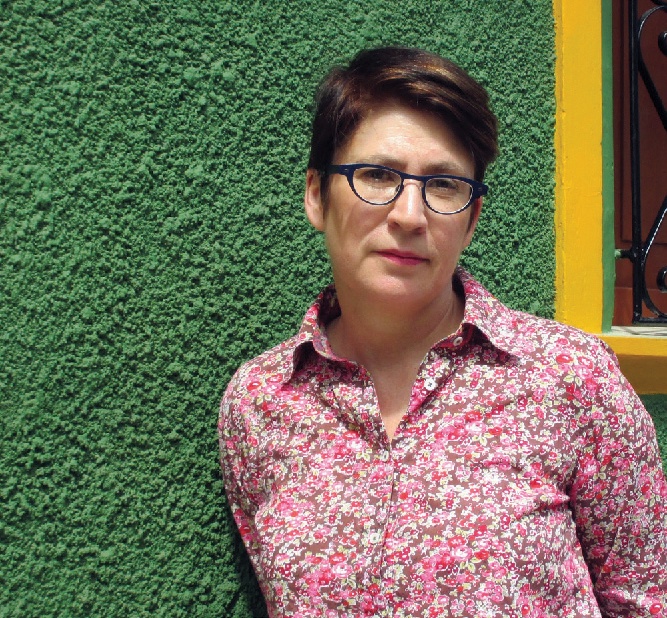Columbia College | Columbia University in the City of New York
The Essentials: Rosalind Morris

Photo by YVETTE CHRISTIANSE
Professor of Anthropology Rosalind Morris has spent years studying communities in South Africa and mainland Southeast Asia, especially Thailand, but her interests extend far beyond fieldwork. She is also a filmmaker, a poet and a writer of essays, ethnographies and experimental works. Her latest book, Accounts and Drawings from Underground, is an unconventional collaboration with artist William Kentridge in which she conjures the world of a South African mining company’s laborers and leaders through a narrative based on its 1906 accounts ledger. A Columbia faculty member since 1994, Morris was director of the Institute for Research on Women and Gender and associate director of the Institute for Comparative Literature and Society. She is on sabbatical for the spring semester but returned to campus one afternoon in January to talk about her career and projects.
She grew up in Canada, spending her early childhood in Kimberley, a small mining town in the Rockies, and Vancouver.
She dropped out of college during her third year. “I bought a one-way ticket to the furthest place that I could find, and that happened to be Sri Lanka. Off and on — then and after I’d gone back to school and graduated — I spent a few years roaming the world. I stayed in Nepal for quite some time but also India and Thailand.”
She earned a B.A. in anthropology and English from the University of British Columbia, Canada, in 1986; an M.A. in anthropology from York University, Canada, in 1989; and a Ph.D. in anthropology from Chicago in 1994: “Anthropology as I practice it is a discipline in which you can satisfy almost every intellectual curiosity.”
She describes anthropology as learning to learn with other people. “The great thing about it is that it teaches you that everybody everywhere does things differently, which means that nobody gets to claim that they are absolutely right. I find that hugely liberating and exciting. But to learn from that, you have to be with people for a long time.”
Her fieldwork in South Africa has been ongoing for 18 years. “I’ve gone back every year to the same community for several months, and I’ve watched it change from an apartheid modernist fantasy town — which is to say a white town surrounded by a black township — to a very different place in which land ownership is largely now in the hands of black South Africans, although there is still great inequality. Gold prices go up and down, as do the fortunes of the town. I’ve seen it through a terrible AIDS epidemic, economic disasters and political change, which is how you learn to learn with people.”
She says patience is a useful skill to be cultivated but so is a sense of when to move on. “Worlds don’t stop changing. You can never be finished; you can say ‘I don’t want to do it anymore,’ or ‘I’m no longer able to,’ but it won’t be because an object — the world — has been exhausted or finally known. You may be exhausted, but the object won’t be.”
She teaches “The Ethnographic Imagination,” the last part of the sequence for the undergraduate major, among other courses.
She says the most valuable thing she can do for her students is to help them “recognize that it’s possible to do everything differently and therefore they must decide, always, how they wish to do things. I would hope, too, that I instill in them a hunger for learning how to be with people who are different from themselves.”
She is about to release a collection of essays, Wars I Have (Not) Seen; a book on the history of the idea of fetishism; and a film adaptation of Gertrude Stein’s last novella, Brewsie and Willie. “I believe in writing in different forms in answer to different needs. I don’t think one should have one voice across all domains. It’s very exciting to be able to move from medium to medium, genre to genre, and to think about the possibilities that are specific to each medium.”
She is also working on an opera — her first — based on Abdelrahman Munif’s novel Cities of Salt, set at the time of the discovery of oil in the Gulf states. The opera had its first public workshop at the Royal Opera House, Covent Garden, last July. The composer, Zaid Jabri, is a Syrian now living in Poland and her co-librettist, Yvette Christiansë, teaches at Barnard. “We had a story we felt was singular and urgent, and that it demanded this form. We reread it together and plotted it in terms of what would be essential to communicate it. Then we drafted the libretto together literally line by line, which is not a recipe that anyone else should follow, probably. But it worked for us.”
— Alexis Tonti SOA’11
Issue Contents
Published three times a year by Columbia College for alumni, students, faculty, parents and friends.
Columbia Alumni Center
622 W. 113th St., MC 4530, 6th Fl.
New York, NY 10025
212-851-7852
cct@columbia.edu
Columbia Alumni Center
622 W. 113th St., MC 4530, 4th Fl.
New York, NY 10025
212-851-7488
ccalumni@columbia.edu

